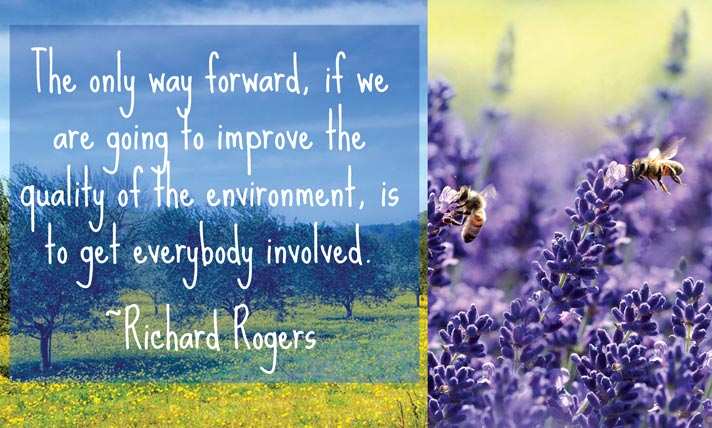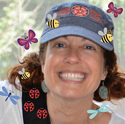Love Thy Pollineighbor – February 2017
Jacksonville was bursting with magic that brisk December evening. White lights and pine swags, staples of a vintage Christmas, on each door and window beckoned passersby indoors for cozy warmth. The scent of holiday charm filled the air.
I walked into old city hall, sat, and anxiously waited to deliver my Bee City USA (BCU) presentation. Heading to the podium, flashes of Dorothy nervously approaching the fiery and powerful wizard of Oz came to mind. I chuckled to myself, because when I looked up, before me was the kind face of Mayor Becker and his equally supportive team. No fire. No red shoes. All was well.
Neonicotinoids—During the presentation I shared that the EU banned neonicotinoids (neonics), a broad-spectrum insecticide with a burgeoning reputation for harming bees. According to Xerces Society, neonics are systemic chemicals absorbed by the plant and dispersed through plant tissues, including pollen and nectar. They persist in the plant, flower, fruit, roots, and soil.
Like many synthetic pesticides, neonics persist for years, destroying vital soil organisms, running off into local waterways, and poisoning aquatic life, invertebrates, and humans. Bees who nectar on the flowers take the toxic pollen back to the hive. Other pollinators and birds are also affected. Even our companion animals and children who play near sprayed areas are exposed.
Check your garden products for the following neonics:
- Imidacloprid
- Clothianidin
- Thiamethoxam
- Acetamiprid
- Dinotefuran
Council Member Garcia asked if the neonicotinoid ban resulted in any pollinator recovery. I let him know that scientists are still reviewing the data and expect to finish their risk evaluation in early 2017.
According to a Guardian article, “…evidence linking the pesticides to bee population declines has mounted.”
Phyllis Stiles, founder of Bee City USA, consulted with experts and shared there is not yet conclusive information about the impact on bees, but scientists discovered the EU ban on neonics had no impact on crop yield. This is significant because it invalidated the argument neonics are necessary for increasing yields.
Stay tuned next month for more interesting facts on neonics.
Will Jacksonville become a BCU?—The council enthusiastically embraced the idea of moving forward for Jacksonville’s BCU status! Care to help? I’m looking for a few pollinactivists to join the fun. Email me. Let’s chat!
Upcoming Forum—Protecting Pollinators: The Benefits for Ecosystems and Food Security in Oregon. If you want to learn more about neonics, safer ways to maintain your property, and how to help native pollinators thrive, save the date for this forum on February 11, 9:00am-4:30pm, that will change your world!
Hosted by Oregon nonprofit Beyond Toxics, Pollinator Project Rogue Valley, and the OSU Extension, the Protecting Pollinators forum is for homeowners, nurseries, municipalities, landscapers, and orchardists. Local and national experts will share their extensive knowledge on the effects of neonics on our landscapes and ecosystems, and they will offer solutions to the problem of native pollinator decline. Location: OSU Extension, Central Point. Admission: $10 pre-registered, $15 at door ($5 discount for Master Gardeners).
Get tickets at: https://www.eventbrite.com/e/protecting-pollinators-forum-tickets-30472450921.

 When she’s not working, volunteering, fiddling about the garden, photographing nature, being a pollinactivist, blogging about social and environmental justice, or pawning her eco-children’s book, Kenda, a former Monarch butterfly docent, gets her kicks hanging with her husband, her dog, and the pollineighbors.
When she’s not working, volunteering, fiddling about the garden, photographing nature, being a pollinactivist, blogging about social and environmental justice, or pawning her eco-children’s book, Kenda, a former Monarch butterfly docent, gets her kicks hanging with her husband, her dog, and the pollineighbors.